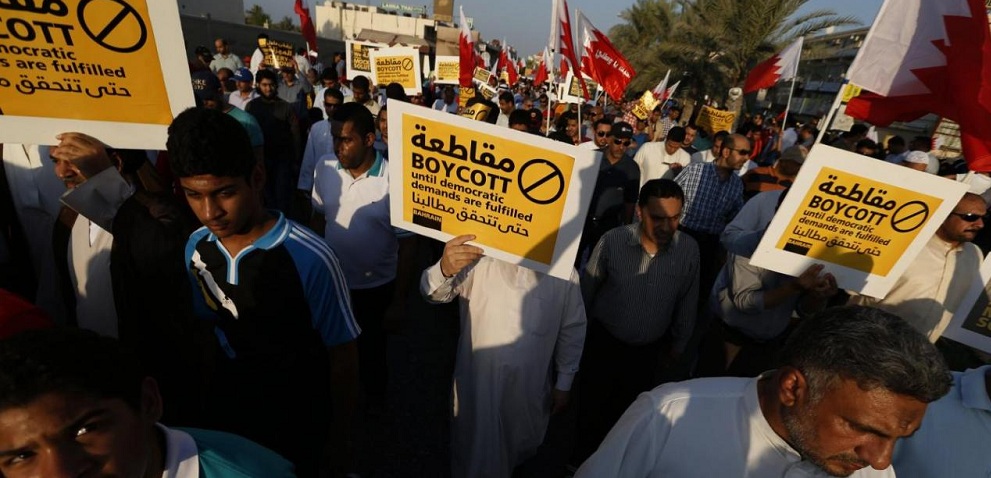Alwaght- Holding elections and establishing democratic mechanisms marked by recognition of the political parties, freedoms, and civil rights, governance of people, succession of the elites, and other requirements mentioned in the constitutions are the cheapest and main instruments to address the social, political, and economic crises in today’s world.
This model of governance that over the past century spread from the West to the East now poses the most serious legitimacy challenges to the despotic Arab monarchies in the Persian Gulf region. Despite the fact that the region has experienced the democratic course of government making years ago, the Arab rulers are yet to fully adjust themselves with the election and parliament as the two main symbols of democracy and as two instruments bringing a political identity to the nation, something making them suffer from legitimacy crisis, though with various degrees.
The Kingdom of Bahrain is one of these regimes. The elections in this country under the ongoing pro-change and reforms protests have shown their undemocratic and ostensible face. The small island nation has held its parliamentary election Saturday while there was no social and political enthusiasm that is characteristic of a genuine election.
Election: Al Khalifa’s instrument to stage political shows
The political structure in this small state is constitutional monarchy and the parliament has two branches: The People’s House and the Senate, each with 40 seats. According to the constitution, the People’s House members are elected in a general election but the Senate members are installed by the monarch.
The main flaw in the Saturday elections was the lack of key factor of competition as an essence to the political participation and advancement. King Hamad bin Isa Al Khalifa on June 11 announced that the opposition groups will join the parliamentary race. But his statement slashed key opposition groups including the Al-Wefaq National Islamic Society which represents a large part of the Shiites of the country who are a majority of the nearly 1.5 million population.
In the 2010 election, nearly half of the parliament (18 seats) was under control of Al-Wefaq. A year after, the protests erupted in the country similar to what was happening in the region represented by the anti-government uprisings, known as the Islamic awakening. The Al Khalifa rulers, having the backing of the foreign forces including those from Saudi Arabia, adopted an iron fist policy in dealing with the protestors instead of entertaining a reform plan which was a demand by the demonstrators. Now many opposition leaders are in jail or sent to exile with sham charges. Sheikh Ali Salman, the Al-Wefaq movement’s chief, is among them. Only 23 of the 40 members of the previous parliament are allowed to rerun for their seats in this year’s election.
Lost with the political freedom is the social equality as a result of the economic crisis. Oil accounts for 70 percent of the government’s income. Over the past few years which the oil market suffered low prices, the government’s budget deficit surged. Now the state’s debts equal 88 percent of the gross domestic product (GDP). Reports suggest that the hard currency reserves are only $2.3 billion– enough only for a single month imports. The economic crisis beside the inequality in the distribution of the sources apparently push the Shiite citizens into a second-degree citizen status and life quality.
A large part of the citizens and political factions have boycotted the election. Holding the election in the middle of such critical circumstances not only does not rid the government of crisis but also Manama leaders will undergo further pressures as the social networks now break the state monopoly over the media and bring out into open the government’s violations and the undemocratic way of the election arrangement.
The Human Rights Watch has reported that the Manama regime has withheld the right to enjoy free elections by detaining the opposition leaders, cracking down on the anti-Khalifa ruling family protestors, and banning the opposition factions. Saeed Ahmed al-Wadi, the head of the Bahrain Institute’s for Rights and Democracy (BIRD), a Bahrain rights monitoring groups based in Britain, has said that the regime cannot imprison and torture the opponents and at the same time seek international credibility by holding an undemocratic election.
West worried about dictatorship and democracy in Bahrain
Despite clear violations against the human rights, anti-protest crackdowns, and holding an undemocratic election by Al Khalifa rulers, the West has stepped up support to the regime. The Western allies of Manama have failed to seriously address the abuses against the peaceful protestors. The root of this inaction may rest in the concerns of the Western powers’ about allowing democracy to grow in the Arab states. The past experiences show that allowing democratic mechanisms to rule the regional states will end up with governments mainly pro-independence, pro-Islamic values, and anti-Israeli. The elections in Egypt, Tunisia, Iraq, and Turkey give good examples of such governments.
Bahrain has a strategic geopolitical position. It hosts the US Navy’s Seventh Fleet. It is also close to two key regional rivals, Saudi Arabia and Iran, and has a Shiite majority. All these features urges the Westerners to close eyes to Al Khalifa suppression of the protesters and praise the highly superficial and sham political reforms.
From another perspective, the West is well aware of the consequences of the abusive policies of its ally which could include the gradual radicalization of the society and the pro-subversion opposition forces. This awareness motivates periodic pressures on the despots to stage economic and political reforms for relaxation of the accumulated anger of the opposition voices. Despite this gesture, the Bahraini regime is inflexible and non-compliant with the democratic government mechanism. That is what makes large-scale crises in the future an unavoidable reality.



























